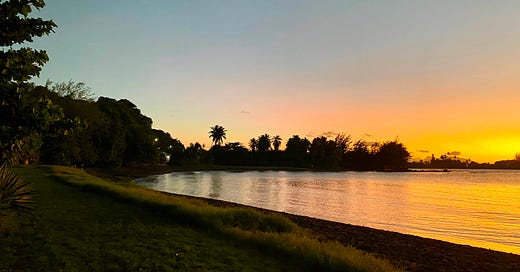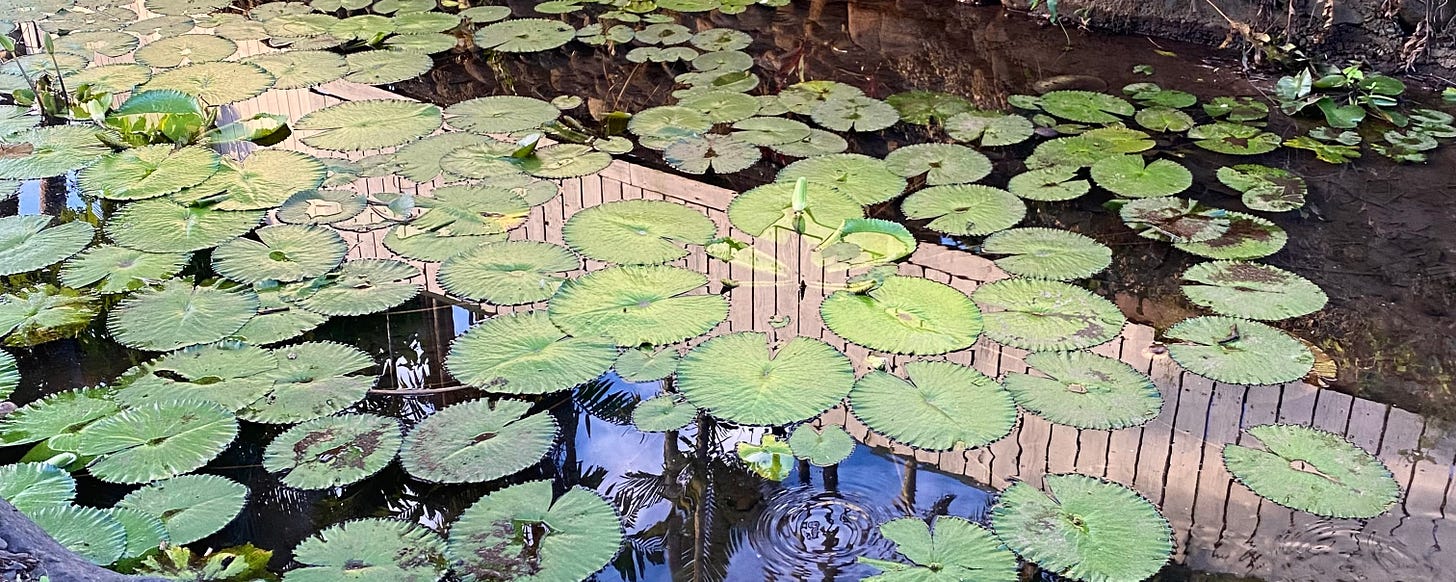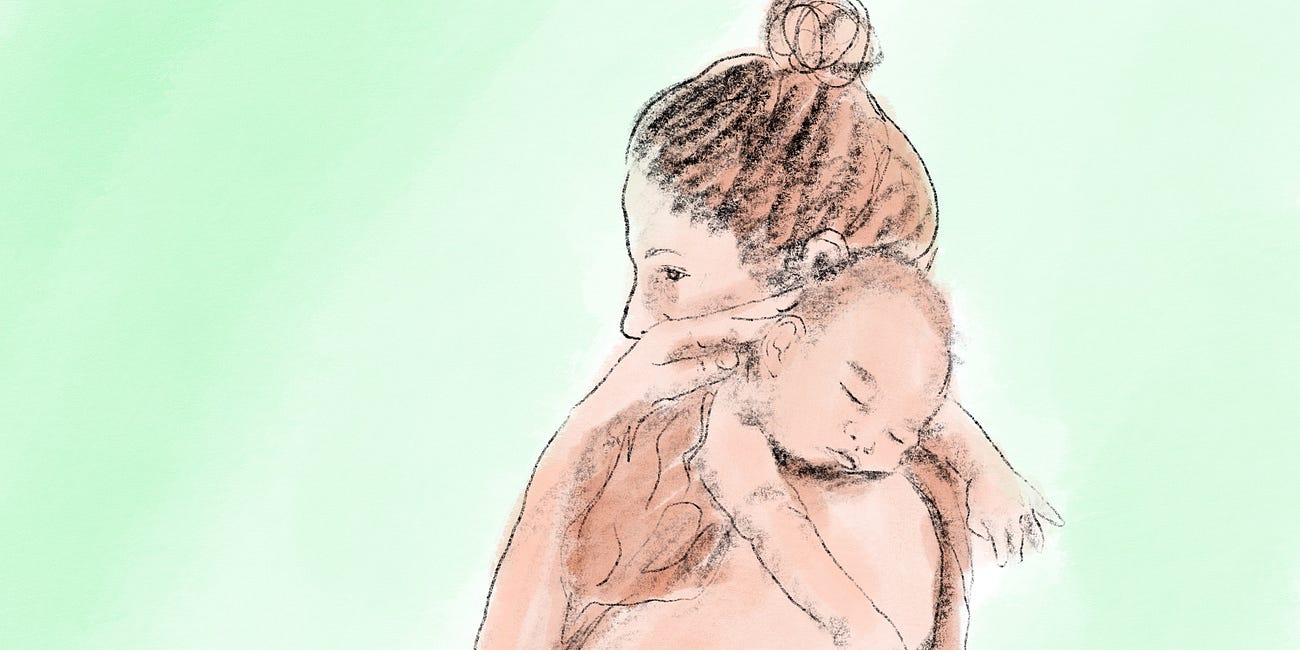We arrived in Tahiti on Monday and are in no-man’s land until the baby arrives. It’s a funny feeling, because on the one hand it’s like a little holiday: snorkelling off the black sand beach on our doorstep, going for drives, eating at restaurants, bathing in waterfalls. On the other hand, it’s hard to make any plans knowing that the baby could decide to arrive any minute.
I wrote previously about having a baby as an expat in French Polynesia. One of the big challenges is if you don’t live on the island of Tahiti. Mo’orea is the next largest in terms of population and only 30-60 minutes by boat from the capital Papeete, however they actively discourage births at the hospital there and tell everyone to go to Tahiti for their birth.
This wasn’t always the case.
My mother-in-law worked as a midwife since the early nineties, and she’d be on call at all hours to deliver babies in the hospital on Mo’orea. If there was an emergency, she’d accompany the ambulance to the airfield and the woman would be loaded onto a light aeroplane to go to Tahiti. These days, there’s a helicopter pad just opposite the hospital.
From her recollection, the hospital stopped accepting first time mothers from 2000. In 2015, the Centre Hospitalier de Polynésie Française (CHPF) mandated that all mothers birth in Papeete. Birthing facilities at the hospital in Mo’orea were shut down with plans to improve the facilities and offer it again in the future. However, it’s been 10 years with no movement, and in the meantime women in Mo’orea and all the other islands are told to arrive in Tahiti at least 3 weeks ahead of their due date.
We’re lucky that we can afford an Air B’n’B.
I booked for 1 week ahead of the due date and 1 week after and just have to hope the baby arrives sometime within that window. But it’s not cheap, and there are plenty of women who couldn’t afford to do this and who don’t have family they can stay with.
I’ve been told that there are some government run pensions for women to stay at while they await their baby, however they’re not set up for a whole family, so you’d need to leave any other children and your partner at home.
Some women, who might have other children to look after or work commitments, will book a caesarean so they can go to Tahiti and back within the same day. It boggles my mind that this ‘easier’ option involves major abdominal surgery.
A logistical challenge.
It’s challenging to prepare for birth on another island, especially since we have Auguste to manage. We had to make multiple contingency plans if the baby decides to arrive in the evening when there are no boats to Tahiti, or if we need to send Auguste back to Mo’orea once labour starts. I feel like we’ve talked out every possible scenario and I still feel unprepared.
Over the last few months, Martin and I have been doing a lot of reading about the best conditions for a smooth labour, and there’s really no replacement for labouring at home in a place that’s comfortable and familiar. The setup here, where women have to leave their home, their family and their community, is not exactly facilitating this.
No options for birthing at home.
Home births here are possible but indirectly discouraged by the medical system by making insurance for midwives who want to do home births astronomically expensive.
In Australia, there are an increasing number of hospitals offering publicly funded home birth programs. It looks to be a growing trend for women to want to birth outside of the hospital and avoid a medicalised birth. And no wonder; so many women I know have had traumatising births in hospitals where they weren’t respected or listened to.
I have one cousin in Australia who’s had both of her babies at home. I remember when I first heard about her plans I was shocked; what if something goes wrong? Don’t you want a full medical team immediately on hand? Everyone I knew gave birth in a hospital, to do otherwise sounded crazy.
But she was super chill about it. A few years later, having experienced the birth of Auguste, I understand why. She created a setting where her body would have the best chance of delivering naturally, and she had plans in place in case she needed assistance. Both births went super smoothly.
Tumu Ora is a great start, but it’s not enough.
The maison de naissance here is a great option for women who want the guidance of a midwife, as well as the assurance of a hospital right next door. But there’s only one here on Tahiti and no other options for any of the other islands.
I hope that this growing trend towards home births and on-island births starts to pick up momentum here as well as in Australia, and things start changing to allow women to have their babies in the place they’re most comfortable.
If you liked this article, try…
A week in Pointe Vénus, Tahiti
When we decided to have our baby on Tahiti rather than in Australia, we discovered through meetings with the midwives at the hospital on Mo’orea that we couldn’t actually have our baby there (you can read about the whole experience of having a baby as an expat in Tahiti here
Reflections on motherhood.
I didn’t always want to be a mother. It wasn’t a driving force or a lifelong dream like many women I know. From the outside, it looked like a lot of hard work and sacrifice; putting aside your own goals and dreams for a time or sometimes giving them up entirely.












